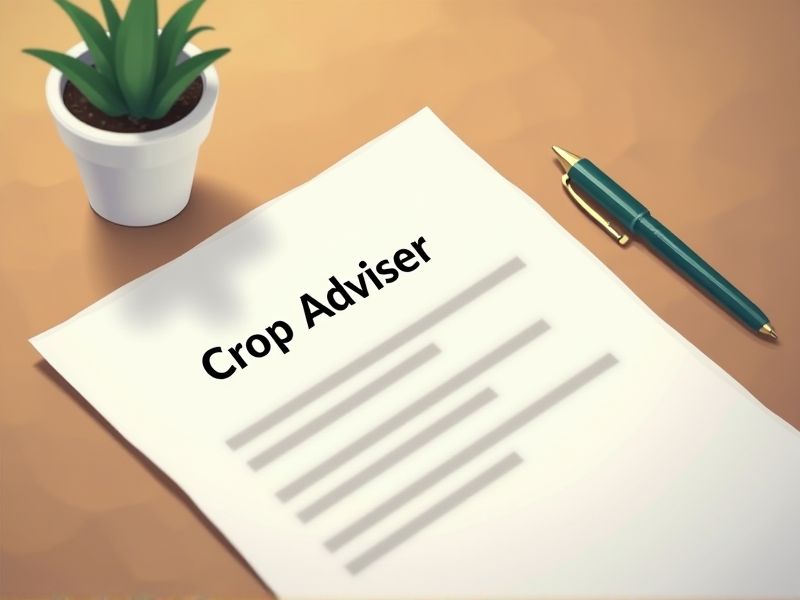
Crop advising requires a deep understanding of agricultural science and sustainable farming practices. Certifications ensure that a Crop Adviser possesses the necessary expertise to provide accurate guidance for improving crop yields and soil health. They also establish credibility with farmers and agricultural stakeholders, enhancing trust in professional advice. Some important certifications that a Crop Adviser might need are listed below.
Certified Crop Adviser (CCA)
Certified Crop Advisers (CCAs) are essential because they gain specialized knowledge through rigorous examination, which enhances their ability to provide evidence-based recommendations to farmers. Their certification ensures adherence to ethical and professional standards, promoting trust and accountability in crop management advice. In turn, farmers benefit from optimized crop yields and reduced input costs due to the precise nutrient and pest management strategies provided by CCAs. This expertise also fosters sustainable agricultural practices by integrating environmental stewardship into crop advisory services.
Certified Professional Agronomist (CPA)
Having a Certified Professional Agronomist (CPA) ensures that crop advisers possess advanced expertise in soil and plant science, resulting in improved decision-making for sustainable practices. The CPA credential demands rigorous education and continuous learning, which translates to up-to-date knowledge applied in crop management. CPAs are equipped to address complex agricultural challenges, such as pest resistance and nutrient management, thereby enhancing crop yield and safety. Their role also involves advising on environmental regulations, leading to responsible farming that aligns with legal standards.
Pesticide Applicator License
Crop advisers need a Pesticide Applicator License to ensure they have a thorough understanding of safe pesticide use and environmental protection. This license helps reduce the risk of harm to crops, humans, and wildlife by enforcing standardized safety procedures. Having a license validates the adviser's expertise, fostering trust with clients and regulatory bodies. It ensures compliance with legal frameworks, thus preventing potential penalties for unauthorized pesticide application.
Integrated Pest Management (IPM) Certification
IPM Certification equips crop advisers with knowledge on sustainable pest control, leading to environmentally responsible practices. This approach minimizes reliance on chemical pesticides, reducing potential harm to ecosystems. Certified advisers can provide farmers with tailored pest management strategies, optimizing crop yield and quality. Regulatory compliance and increasing consumer demand for eco-friendly produce drive the necessity for certified expertise in integrated pest practices.
Nutrient Management Certification
Nutrient Management Certification ensures crop advisers understand how to optimize nutrient use, reducing environmental impact and improving crop yields. This certification equips advisers with knowledge of soil fertility and nutrient interactions, enhancing their decision-making capabilities. Regulations around nutrient runoff and environmental protection necessitate that advisers possess up-to-date expertise in sustainable practices. Certified advisers often gain trust from farmers and stakeholders, leading to better professional opportunities and collaborations.
Soil Health Certification
Soil Health Certification equips crop advisers with verified knowledge to enhance sustainable farming practices. Improved soil health directly results in increased crop yields and reduced dependency on chemical inputs. Certification ensures advisers provide evidence-based recommendations, fostering trust among farmers. Sustainable practices also contribute to long-term environmental benefits, which align with regulatory trends.
Irrigation Management Certification
Irrigation Management Certification is critical for Crop Advisers to ensure water resources are used efficiently, minimizing waste and maximizing crop yields. Understanding precise irrigation techniques reduces the risk of overwatering, which can lead to soil degradation and crop diseases. Certification arms advisers with the knowledge to implement technology-driven water management solutions, enhancing sustainable agriculture practices. As climate variability impacts water availability, certified advisers play a crucial role in adapting farming strategies to maintain crop productivity.
Organic Agriculture Certification
Organic agriculture certification ensures that a crop adviser has knowledge of sustainable farming practices, promoting soil health and biodiversity. Certification enhances the adviser's credibility and trustworthiness when guiding farmers transitioning to organic systems. It provides a framework for understanding regulatory requirements essential for market access. Certification influences consumer perception, leading to increased demand for certified organic products.
Precision Agriculture Certification
Precision Agriculture Certification equips crop advisers with specialized knowledge in the use of advanced technologies like GPS and remote sensing, enhancing decision-making for farm management. With certification, advisers demonstrate proficiency in optimizing resource use, subsequently increasing crop yield and reducing environmental impact. The structured training involves data analysis skills, crucial for tailoring agronomic solutions to specific field conditions. As agriculture evolves with technology, certified advisers become invaluable for implementing sustainable practices.
Geographic Information Systems (GIS) Certification
Geographic Information Systems (GIS) Certification equips crop advisers with the skills to analyze and interpret spatial data, which enhances decision-making for site-specific management. Analyzing soil variability and crop health through GIS leads to more accurate recommendations, improving yields and resource efficiency. GIS Certification ensures advisers are proficient with technology used in assessing environmental impacts, crucial for sustainable farming practices. Understanding spatial trends through GIS supports effective communication with stakeholders about agricultural advancements and strategies.
Summary
When you obtain certifications as a Crop Adviser, you can expect enhanced credibility in the agricultural community. Certifications validate your expertise, making farmers more likely to trust your guidance. This trust results in increased client engagement and potentially higher consulting fees. In turn, the combination of trust and credibility can lead to more successful crop outcomes for your clients.
